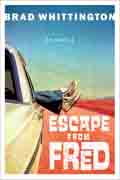Fred, a parable crying out to be a musical
The trouble with Brad Whittington’s Fred trilogy is that musicals differ from novels. The structure of a musical requires starker characters, exclamation points instead of periods, slapstick, not nuance. Whittington packaged his chronicle of the coming of age of Mark Cloud as a novel in three parts, but he really wrote a musical.
The result is a sometimes disconcerting collection of effervescent scenes connected only by an introspective and self-absorbed young Christian. The musical-as-novel structure works well enough in book two, “Living with Fred.” But in the third book, “Escape from Fred,” it falls apart.
by an introspective and self-absorbed young Christian. The musical-as-novel structure works well enough in book two, “Living with Fred.” But in the third book, “Escape from Fred,” it falls apart.
Fred’s main character, Mark Cloud, reminds me of a chaste, male Ado Annie, a supporting character with a penchant for goofily complicated situations, improbably resolved. But beneath that Puritan Ado Annie lies someone more complex. Belief in the rational and the supernatural meet in Mark Cloud, which creates the discomfort you would expect. He is both a budding entrepreneur who believes in modern science and a preacher’s kid who appreciates his father’s faith. Having observed the transforming effect of religious experience in the people around him, he cannot discount it. His debates with his Dad and others about science and the Bible do not end in clearcut victory for either side. They do present the sort of nuance often missing from depictions of the religious right, particularly Southern Baptists.
There is no religious uniformity in Cloud’s circle of familiars (he doesn’t really seem to have friends), although there are few open atheists. Several people, like Cloud himself, don’t really seem to have any experience of God. Cloud wants that experience; it would clearly make his beliefs more tenable if he personally felt God speaking to him.
 Religion in the Fred trilogy hinges on experience. Religious experience tends to get pooh-poohed as a proof of God – such experiences make up what scientists would dismiss as ‘just-so’ stories, not testable or even universally experienced. Yet those who have these experiences clearly see them as real, and often change their lives because of them. William James said, “we build out our religion in the way most congruous with our personal susceptibilities.” But James also said that even if such experiences is caused by ‘the higher faculties of our own hidden mind,” they were ‘not merely apparently, but literally true.” Neuroscientists like Andrew Neuberg and Nina Azari have produced imaging studies that show the brain does reflect religious experience (though in truth it would be a more interesting sign of God if the brain did not show something going on).
Religion in the Fred trilogy hinges on experience. Religious experience tends to get pooh-poohed as a proof of God – such experiences make up what scientists would dismiss as ‘just-so’ stories, not testable or even universally experienced. Yet those who have these experiences clearly see them as real, and often change their lives because of them. William James said, “we build out our religion in the way most congruous with our personal susceptibilities.” But James also said that even if such experiences is caused by ‘the higher faculties of our own hidden mind,” they were ‘not merely apparently, but literally true.” Neuroscientists like Andrew Neuberg and Nina Azari have produced imaging studies that show the brain does reflect religious experience (though in truth it would be a more interesting sign of God if the brain did not show something going on).
Cloud doesn’t get so philosophical. His occasional wrestling with questions of religion without the experience of God mostly serves as a foil for his follies in the first two books of the trilogy. In the much darker book three, the foil becomes the focus, and the novel-as-musical structure stops working. Comic musicals depend on miscommunication. But in this third book, those mishaps become Pinteresque, unpleasant. Cloud struggles with himself, God and everyone. He finds not Jesus, but Kerouac. Like Kerouac (and Jesus), he hits the road.
On his road to rebirth, Mark Cloud faces ultimate questions: is there really a God? How do we experience that God? Can we do what that God requires of us? It’s jarring to run into these questions after two novels dominated by slapstick. Perhaps if the trilogy were just one book, I would not have minded as much. For some reason, Whittington also dodges many moments of passage in a boy’s life – Mark Cloud never seems even tempted to masturbate. His first real kiss precipitates major crisis. Contrast this with Steven Pressfield’s “Tides of War,” another novel that stars a supporting character buffeted by ultimate questions.  That character, Pommo, meets us from his jail cell, where he awaits trial for assassinating the most famous man of his ear. Pommo, like all of Pressfield’s characters, is richly painted. Many of Whittington’s feel like ghosts. True, Pressfield’s painting takes time, but when Pressfield warms up and strikes the bell of truth, it rings more clearly than anything in the Fred trilogy. For example, at one point a character in that novel admonishes his fellows by saying “You dream of what will be, and disdain what is. You define yourselves not as who you are, but as who you may become, and hasten over oceans to this shore you can never reach.”
That character, Pommo, meets us from his jail cell, where he awaits trial for assassinating the most famous man of his ear. Pommo, like all of Pressfield’s characters, is richly painted. Many of Whittington’s feel like ghosts. True, Pressfield’s painting takes time, but when Pressfield warms up and strikes the bell of truth, it rings more clearly than anything in the Fred trilogy. For example, at one point a character in that novel admonishes his fellows by saying “You dream of what will be, and disdain what is. You define yourselves not as who you are, but as who you may become, and hasten over oceans to this shore you can never reach.”
To be fair, Pressfield’s subject is the beguiling Alcibiades, his background nations in conflict over their essence. War provides a natural setting for drama and the testing of human character. Whittington writes about an evangelical everyman wrestling only with himself. And the Fred trilogy is enjoyable. I warmed to the first book, and quickly read the second. Even that troublesome third book resolves reasonably well (here’s a far more favorable review). Fred might be set in Texas, but it makes good beach reading anywhere.